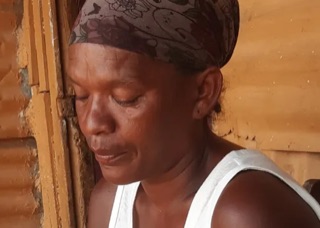
Montagu police say they adopt a multi-disciplinary strategy to help victims of domestic abuse and gender-based violence.
However, victims say they receive little to no help at all. This country town some 200km outside of Cape Town, in the Langeberg Municipality, is a beautiful tourist Mecca. It’s dark side — gender-based violence and in some cases victim-shaming police who, by all accounts, would rather turn women away than arrest perpetrators.
Approaching from Robertson, one passes picturesque rock striations where the road has been cut out of the side of a hill (the area is known for its rock formations, amongst other things) and an almost dry river. A hot wind offers no relief as it just serves to blow the dry heat against sun-baked skin and tries to scorch your eyeballs.
When Daily Maverick visits at the start of February, the town is searingly hot, and at 11 am the temperature is already at 39 degrees Celsius.
Entering Montagu’s pretty, welcoming main street — lined with old attractive buildings from another era — one is charmed into momentarily forgetting the heat. But the manicured pavements and other signs of affluence like upmarket farm stalls and restaurants inviting visitors to try local produce, freshly-baked goods, and wine, swiftly falls away to reveal how most residents live.
Some 10 minutes past the ‘Welcome to Montagu’ sign, we are on a gently climbing road with significant speed bumps, which are ignored by the minibus taxi which roars past us as we dutifully obey the 60km per hour speed limit. This takes us past the Montagu dried fruit factory, and up towards a smaller area of tightly clustered low-income housing called Mandela Square.
We enter a narrower tarred road with dusty pavements and uneven mismatched fencing and stop at a crossroads surrounded by some humble brick homes and many more informal dwellings. Eyes adjusting to the glare, we note how relatively clean the area is. As we park, Denia Jansen, who leads a gender-based violence healing circle in the area says we must make sure to leave no valuables in sight in the car because:
“It’s not like the city, but you can’t be too careful.”
The street smells of berg winds and tar as we turn it off onto a narrow path where the fence has been interrupted to navigate the many small homes to reach our goal. Despite there being no discernible path but for spaces between dwellings, Jansen leads on as surely as if she were on a bricked-out path. Besides the smell of hot, dry air, the sound of the odd dog, and two or three people walking along the tarred road, there are no other signs of life.
Two of the survivors known to Jansen are sitting here. They look to be in their mid to late 30s and are chatting quietly.
Silvia Plaatjies says her boyfriend has been abusing her for years. She says the abuse is sometimes so bad that she has twice miscarried due to the beatings.
“The abuse is constant… but I also don’t know how to leave him. I do feel that I want to leave, but I also have kids. I am aware that I need help. My life is standing still.”
She has been with her boyfriend for three years. They had a baby who was born prematurely, and delivered at home. When they reached Montagu hospital later in the morning, no one would tell her what was happening with the baby and it died not long after they reached the hospital.
“To be honest, I am an HIV-sufferer… and when I go to the clinic, there are certain people there (staff) who want to badmouth you and scold you. Then you don’t feel much like going back to the clinic to collect your medication. I know I’m wrong, but they make you feel so bad.”
Image: Gender-based violence survivor Silvia Plaatjies recalls some of the abuse she has experienced, in Mandela Square, Montagu, on 2 February, 2024. (Photo: An Wentzel)